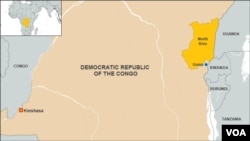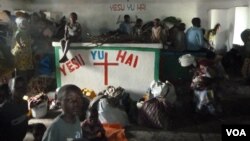Congolese rebel group M23 says it will not give up the captured city of Goma, despite a demand from regional leaders to withdraw.
Bertrand Bisimwa, the political spokesman for M23, told VOA ((French to Africa Service)) Monday that the group will stay in Goma because there have been no direct negotiations with Democratic Republic of Congo President Joseph Kabila.
Mr. Kabila met briefly with M23 political leader Jean-Marie Runiga in Uganda's capital recently, but there were no official talks.
Who Are the M23 Rebels?
Who Are the M23 Rebels?- Named for March 23, the date of a 2009 peace deal
- Contains fighters once loyal to a rebel army who assimilated into the DRC army, then defected
- Formed in early 2012
- Dominated by the Tutsi ethnic group
- Also known as the Congolese Revolutionary Army
- UN experts say the group is backed by Rwanda, which Rwanda denies
The rebels seized the eastern city last week and have since taken the town of Sake to the west. The group has said it will topple the Kabila government.
M23 says its military leader, Sultani Makenga, is traveling to Kampala to talk with regional military chiefs.
Also Monday, U.S. State Department spokesman Victoria Nuland said she is concerned that what she called a "relatively modest" group of rebels was able to take territory in Congo, despite the presence of U.N. peacekeepers there. She said the U.N. troops, known as MONUSCO, were not able to do what they are mandated to do.
"We are a major supporter of MONUSCO and it needs to be able to be effective in securing populations, which is not currently the case," she said.
U.N. peacekeepers in Goma gave up defending the city after Congolese soldiers withdrew last week.
The United Nations has accused Uganda and Rwanda of giving support to M23, a charge both countries deny.
Goma is located on the DRC-Rwandan border. Rwandan President Paul Kagame was absent from a meeting of several central African presidents in Kampala on Saturday.
M23 consists of former rebels who once were integrated into the Congolese army but deserted early this year, complaining of discrimination and poor treatment.
The DRC government has tried for years with little success to pacify the east, where armed groups compete for control of the region's mineral wealth.






